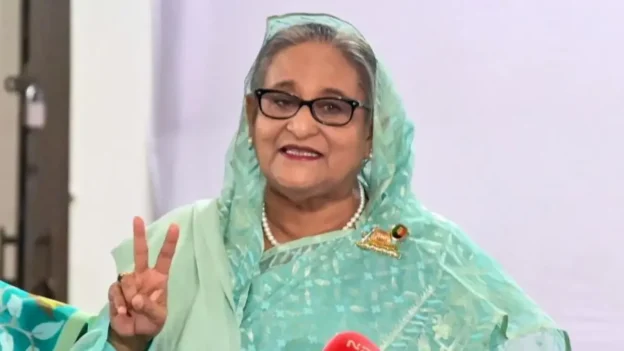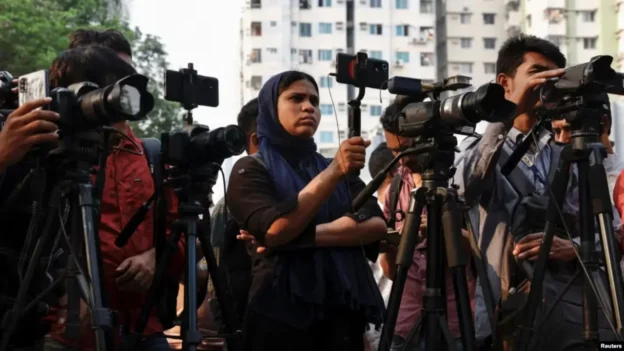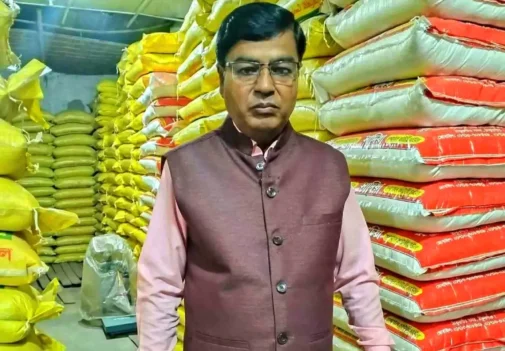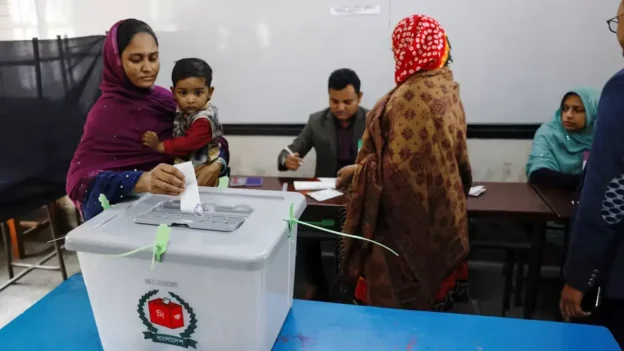Amid uncertainty and socio-political turmoil in Bangladesh, interim government head Professor Muhammad Yunus announced the probable timing of the next general election, scheduling it before the Bengali New Year 1433, which usually begins on 14 April of the Gregorian calendar year. Addressing the nation on the eve of Eid-ul-Azha, Yunus—revealed that the 13th Parliamentary polls will be conducted in the first half of April 2026. The chief advisor of the caretaker government, installed after a student-led public movement ousted sitting Prime Minister Sheikh Hasina on 5 August 2024, called on voters to support a free, fair, clean, and participatory election in the South Asian country of over 170 million people.
Yunus also informed the nation that the country’s Election Commission would provide a detailed roadmap for the polls at an appropriate time. In the meantime, he urged voters to begin preparing to elect candidates who could help end political violence, corruption, and bad governance in Bangladesh. Yunus expressed hope that the forthcoming election would satisfy the souls of martyrs from the July-August 2024 uprising and bring them peace.
“We want the largest number of voters, candidates, and parties to participate in the next elections,” he stated during his address, which was broadcast live on state-run BTV and other media platforms, adding that this would mark the journey to build a new Bangladesh.
Speaking about the three mandates for the current administration—reform, justice, and elections—Yunus commented that the country is aiming for an inclusive election that honours the sacrifices of martyrs. He also highlighted that millions of young voters would be participating for the first time and would hold candidates and parties accountable if the country’s sovereignty, territorial integrity, and national dignity were compromised.
Voters, he asserted, would demand that elected representatives govern with honesty and transparency, avoiding all forms of corruption, partisanship, tender-syndicate manipulation, extortion, and other anti-people activities.
On the political front, the main opposition BNP, which had pushed for an early election (preferably by December this year), expressed disappointment at the proposed mid-April date, arguing that the timing coincides with extreme heat, monsoon rains, and educational examinations. Leaders from former premier Khaleda Zia’s BNP insisted that a December election is still feasible. Communist Party of Bangladesh, Revolutionary Workers Party of Bangladesh, Amar Bangladesh Party, and others echoed the view that winter would be the ideal time for elections.
Previously, Bangladesh Army Chief Waker-Uz-Zaman had also stressed the need for polls by December. In contrast, the newly launched National Citizen Party, along with Nagarik Oikya and Jatiya Ganatantrik Party, welcomed the proposed poll timing.
Bangladesh Jamaat-e-Islami leaders similarly expressed satisfaction with the election roadmap, stating that the public now felt relieved after the announcement. It is noteworthy that Jamaat was recently permitted by the Supreme Court to restore its registration as a political party. Once maligned for its pro-Pakistani roles during the 1971 Liberation War and subsequently banned, Jamaat now prepares to participate in the general election. Political observers believe that along with BNP, Jamaat has emerged as a front runner after consolidating a large religious voter base in the Muslim-majority nation.
It remains unclear whether the Awami League will be allowed to participate in the elections, as the caretaker government recently banned all activities by the ousted premier’s party under a modified anti-terror law and the election authorities suspended its registration. Sheikh Hasina, who has reportedly taken unofficial shelter in Delhi since her departure from Dhaka, remains out of reach, while hundreds of party leaders are on the run to escape arrest. Many of them face a series of police complaints lodged in Bangladesh and expect prolonged legal battles. Some Awami League members have commented on social media that Yunus is merely buying time—nearly ten months to prepare for the polls—and crafting a misleading narrative against Bangladesh’s oldest party.
Meanwhile, Awami League leaders based out of the US condemned the announcement of “so-called elections,” insisting that Hasina was democratically elected and, according to the Constitution, should remain Prime Minister until 2029. Criticizing Yunus for declaring the polls, the expatriate leader termed it “a lollipop” for the people of Bangladesh and argued that Yunus, being an economist, lacks political understanding.
Nonetheless, the ground reality is that the 12th Jatiya Sansad was already dissolved, with Hasina and her representatives having been elected in the 7 January 2024 national polls, which saw a voter turnout as low as 20% after the main opposition BNP boycotted the process.
In his Eid-ul-Azha address, Yunus urged citizens to maintain unity, hygiene, and compassion for the deprived sections of society, aspiring for Bangladesh to prosper and grow as a happy nation. However, his remarks come against the backdrop of intensified atrocities against Hindu and other religious minorities since the ouster of the Hasina government and the advent of the interim government.
Yunus, as he has done recently, shifted blame onto the Awami League, which some interpret as a personal vendetta, asserting that the party under former Prime Minister Hasina created public menace in Dhaka for decades. According to Yunus, “a faulty electoral system” can only foster an autocratic regime like Hasina’s. He went further, blaming the Hasina-led government for the disappearance of large numbers of political opponents over the past 16 years. He claimed that many were detained in secret “disappearance centers”—recently uncovered in Dhaka, Chapainawabganj, and Bogra—now under investigation.
Political violence, forced disappearances, and murder have long marked Bangladesh’s political landscape, beginning with the assassination of Bangabandhu Sheikh Mujibur Rahman, the nation’s founding father, allegedly by forces linked to the Rajakars, Jamaat-e-Islami, and BNP, which has held power for significant periods.
Even Hasina herself now faces an extradition directive from the International Crimes Tribunal (ICT) of Bangladesh, which she established in 2009 to prosecute war crimes committed during the Liberation War in collaboration with then-West Pakistan forces. The ICT accuses Hasina of mass killings—up to 1,400 people, including many youths—during the July-August 2024 uprising, and has issued fresh arrest warrants for her and close associates.
In a sign of shifting national identity, Bangladesh has recently introduced new currency notes that replace the mandatory image of Bangabandhu Sheikh Mujibur Rahman with natural landscapes, heritage sites, and historic palaces, including Hindu and Buddhist temples. While the existing notes featuring Mujibur Rahman remain in circulation, they are expected to be withdrawn over time. Yet, local journalists report that the new banknotes are scarcely available, possibly only printed in limited quantities for experimental purposes.
Yunus has described Bangladesh as “in a state of war,” calling upon the populace to remain united against the fugitive premier, whom he accused of naming more than a thousand infrastructure projects and institutions after her relatives. Yunus asserted that all these names—spanning cantonments, air bases, naval ships, mega-bridges, roads, schools, colleges, universities, and hospitals—have now been changed. He further claimed that the trial of crimes against humanity involving the Awami League and its allied forces is progressing.
Highlighting ongoing reforms, Yunus mentioned the formation of government reform commissions and the work of the National Consensus Commission, which is holding discussions with mainstream politicians. He promised that the upcoming July Charter—crafted in consultation with all political parties—would soon be presented to the nation. His address also touched on the plight of 1.2 million Rohingya refugees currently living in Bangladesh, who fled Myanmar due to conflict in Rakhine province. Recent commitments from Myanmar’s military rulers to receive back around 180,000 eligible Rohingyas were also mentioned.
As Bangladesh approaches the April 2026 polls, the country stands at a decisive crossroads. The coming months will determine whether it can chart a new path towards stability, inclusion, and democracy, or if the cycles of turmoil and contestation will continue to shape its political future.


